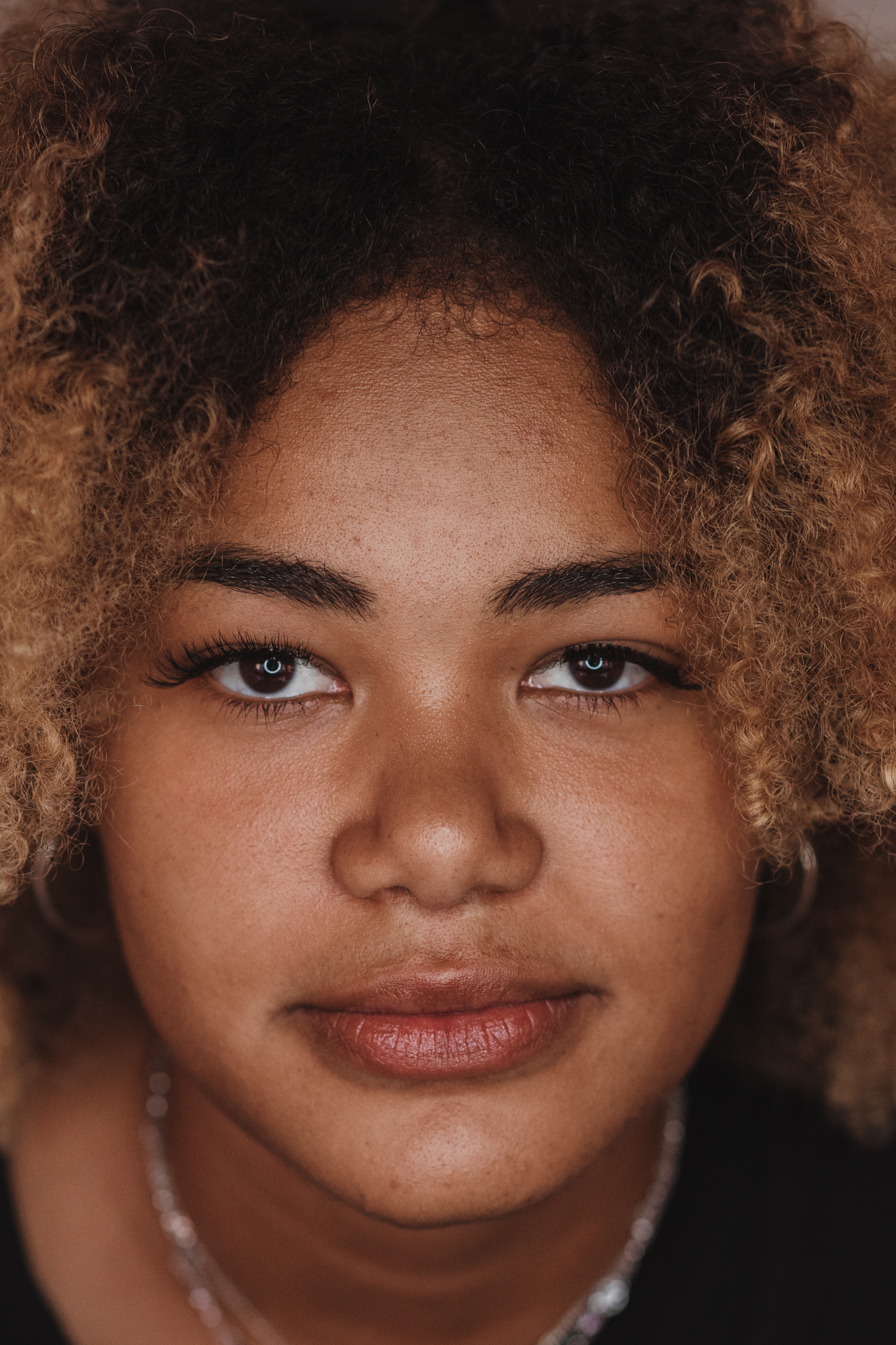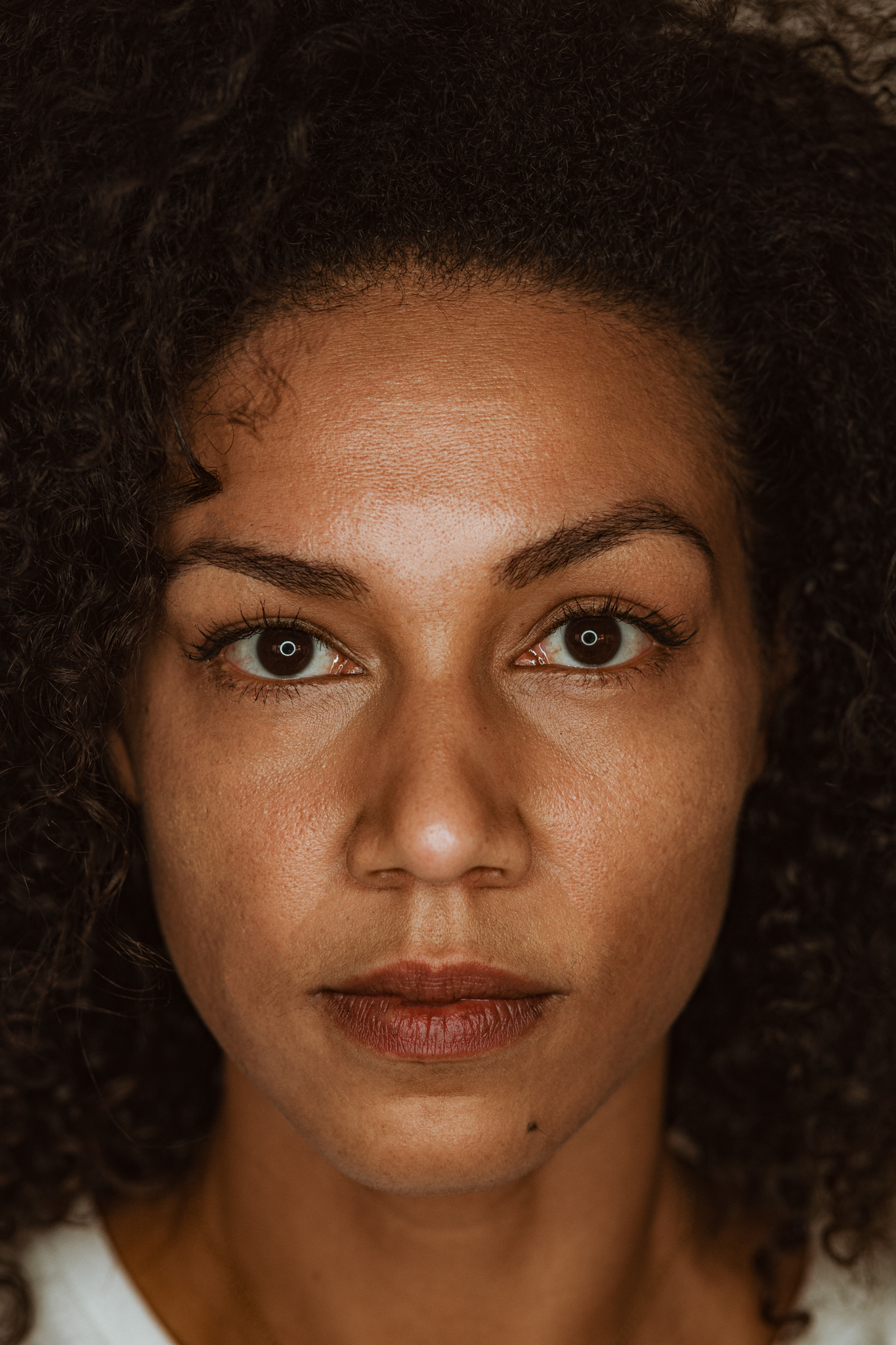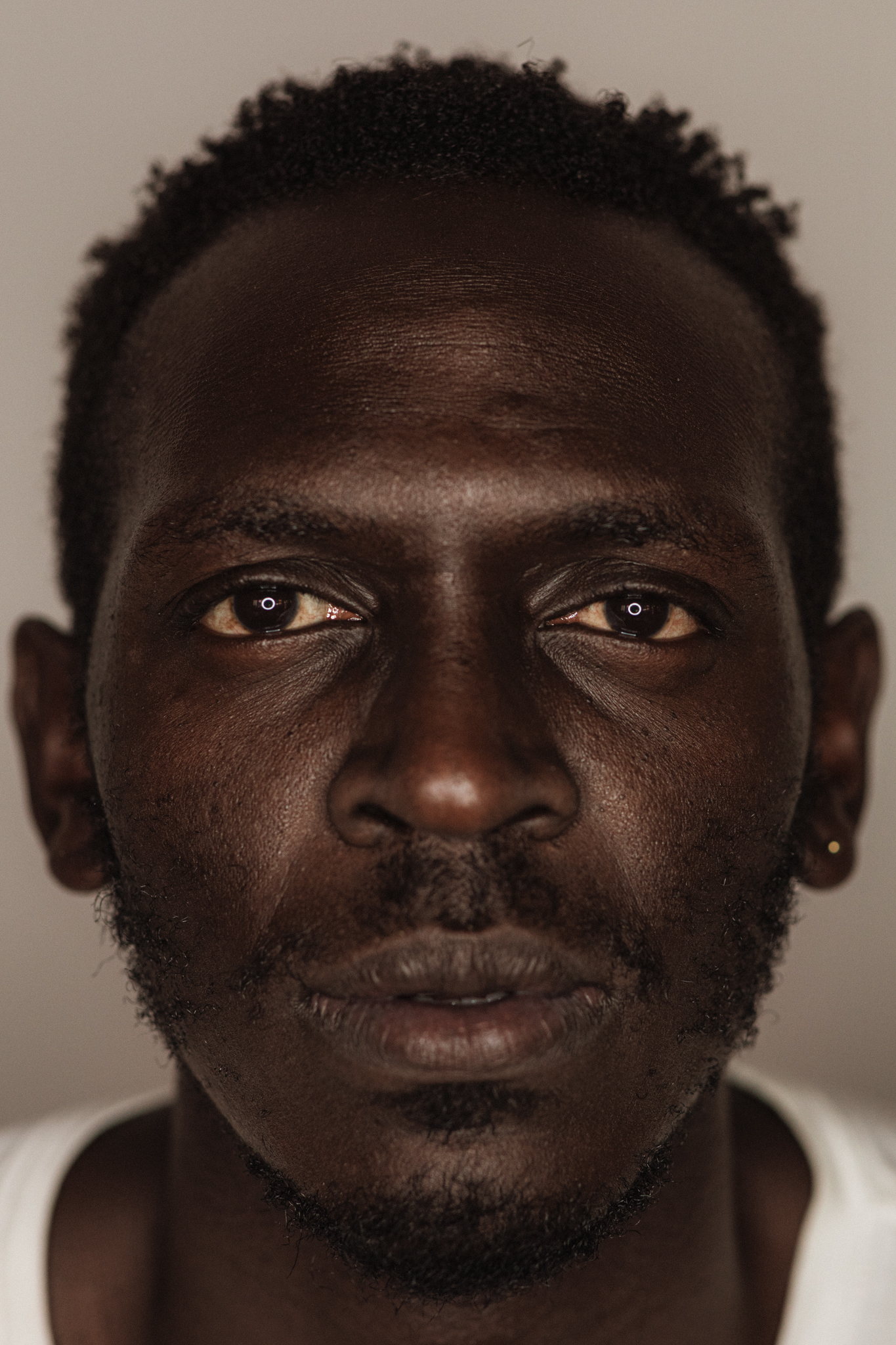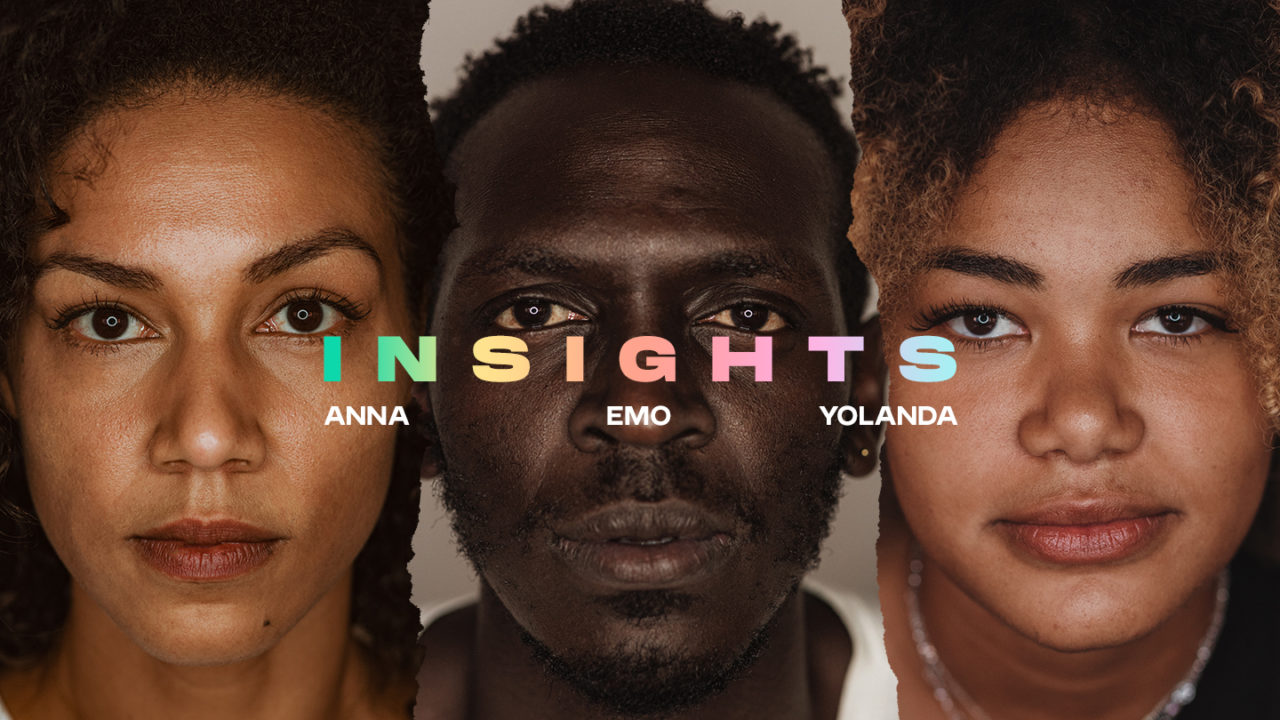The past months have shown us the importance of re-thinking and re-evaluating the way we engage with each other and what roles our individual lives play on a broader scale. Being built on the foundation of community, we have decided to introduce a new project titled ‘Insights’. We want to let our members speak for themselves. We want to listen to their stories and make them heard. While our goal has always been to bring people together, we feel like it is overdue to also address how our community lives different experiences based on their subjective histories. ‘Insights’ is a first step towards embracing these different life-realities and highlight how they collectively form the Braves.

Who Are you? What is Berlin for you? Hometown? The City of Choice?
Yolanda: I am Yolanda, a 20-year-old Afro-German girl. Both. I was born here, I grew up here – it’s the only thing I know. And I love it here.
Anna: My name is Anna and I am a German-Ghanian lawyer living in Berlin. I was born in the south of Germany, in Stuttgart, but I moved to Berlin after I spent some time in Istanbul to study abroad. I just felt like I needed to move to a bigger city – this was ten years ago. Since then it has always been my base. I like to touch base here, but I also like to leave sometimes when it gets too much.
Emo: I am Emo from Kenya. Berlin is my second home. I grew up in Nairobi. I also feel home in Amsterdam.

How has living in Berlin impacted your self-understanding?
Emo: When I came to Berlin I discovered that I am Black. I was always dark in Kenya, but that’s different. I’m Black here. Suddenly I became a Black man, and that also implies that part of your freedom is taken from you. I feel uncomfortable running in the dark during winter. It’s just a strange feeling. When I saw the video of Ahmaud Arbery, and saw how he was shot while running, it hit me because it’s one of my biggest fears. All these things that we see online that show the life-realities of Black people in the US, or even if you hear about racist violence in Germany – you have all these stories in your head. Although I’m not a fearful person, it scares me. When I’m out and see a group of five drunk white men I’m scared. Or in other situations, I think: “I’m ready if something should happen”. And that just shouldn’t be. I hope that something will change in the future. There is room for improvement.
Yolanda: My grandma lives in a small village. I think my mindset would have developed very differently if I had grown up there. I believe that growing up here has made me much more open to different things. At my grandmother’s, in the small village in Schleswig-Holstein, I was the only Black person in many situations and just felt uncomfortable in certain circumstances. Even if nothing explicitly negative happened, I always felt a bit of an outsider. In Berlin, of course, there were situations in which I didn’t feel like I belonged, but the cultures were so mixed that I was often in situations in which I realized there are also people around, who have experienced something like me.
Anna: I tapped into many different circles that taught me a lot about myself, and gave me a lot of food for thought, provided me with a lot of access to knowledge, and taught me tools to cope with certain situations.

Do you perceive yourself differently in varying locations?
Anna: Growing up as a Black girl in Germany in a very white environment, I never really had the feeling of belonging. Belonging to me was my heritage, but it was also my class – if one would still call it that – because I started to move into circles that my parents never had access to. It was difficult to reconnect to home and to the environment because I always felt different. If we look at it in a positive way, it helped me move to a lot of places without ever feeling lonely or with a difficulty to adapt. I can make a home where ever I go. And that is something that I had carried with me moving to Berlin, but also living in Turkey, moving to South Africa, living in Ghana. So the negative experience that I had in my life actually transformed into something that I would call my biggest strength.
Emo: I am very tall, I am Black and when I am in Amsterdam I feel represented – there are many tall people, and there are many Black people. I’m not looked at funny in Amsterdam, I’m just a normal person. Funnily enough, I feel more comfortable in Amsterdam than in Kenya.
Yolanda: In Berlin, you will of course also see Black people on the street, but much more isolated. It was a completely different feeling in London and also at the Black Lives Matter protest in Berlin. I saw how many BiPoC there are in Berlin. Somehow you never feel like there are a lot of Black people – I have the impression that the Black Community in Berlin is not that connected. When I saw all the videos and pictures of the protest, I was completely overwhelmed. I didn’t even know that there were so many BiPoCs, and seeing them was an empowering experience.
What’s your definition of community?
Emo: Community is a sense of family. I noticed that individuality is very predominant in Germany and that it determines how people interact with each other. I grew up in a community. But a sense of community is difficult to find here. Despite having a solid base of friends, it remains somehow difficult. Society is structured differently here. People don’t have time to be there for each other. For me, community is like a big family, where people are there for each other. It’s really important to me, because if you can’t be there for me, then you are not for me. People are always on the run, they don’t stop what they are doing to help other people. Especially in situations where individuals are in personal crises, it really shows whether people feel like they are part of a community, and are there for each other, or whether they just pretend. For me, this was particularly evident in relation to Black Lives Matter and the Braves. Certain people were there for each other and others were not.
Anna: Community to me is a place of comfort and understanding. It’s honest interaction. It’s a support system. I grew up with community, especially the community of sisterhood. Community doesn’t necessarily require everyone to have the same feeling of identity, because identity is something that we choose, thus control. We all have a choice to identify with a certain group, and I think that is the problem with the whole discourse about empathy and inclusion, especially when it comes to marginalized groups. For white people it’s difficult, almost impossible, to identify with a Black person, because they are entitled to individuality, which we are not. We are deemed collectively guilty. My definition of community is a place where we can overcome that, meaning being able to empathize with someone’s pain, or with someone’s struggle, and actively working towards liberation for all – and that includes changing the status quo.
Yolanda: Community is a space in which you feel comfortable, in which everyone has their place, just as they are. Everyone has a vote, everyone is equal, and everyone feels comfortable in this context. I grew up in a women-only cross-generational housing project. For me, community means being familiar and exchanging ideas and feeling free. It means being able to share your opinion without having to withdraw.
What’s the power of Community?
Anna: The power lies in the safety net it may provide. A community should be a place where frustration can be voiced, knowledge can be exchanged, where support can be received. Support does not always need to be verbalized. It can be a hug, it can be togetherness, it can be walking side by side during a difficult time and also understanding the complexity of our existences – our struggles and our oppressions – community is arriving at the finish line together. When speaking about community in running, to me it’s about setting a goal and achieving that goal together. Running exemplifies how I feel as a Black woman in this world. We are all in this race called life, but we are not all granted the same starting positions. If we look at it from an intersectional perspective, we all have different burdens, and we all have different sets of privileges, and that puts us into different positions in life. I’d like to see more running communities, especially in Berlin, being aware of these obstacles that I face as a Black woman in a white man’s world. Competition as such is already a dominating factor in my professional life, so I really don’t care how fast you run. Running to me is rather a coping mechanism, a place of wellness, my meditation. And if you don’t use your power to empower someone else in order to finish “the race of life” together, then what is the point really?!
What do you see as the potential of the Braves collective AND WHich aspect COULD be IMPROVED?
Yolanda: What distinguishes the Braves from other sports clubs is the social aspect of it – the openness and the opportunities in an international realm. I met so many people from Amsterdam, from London, South Africa and that is the great potential for me – to connect. I find the relationships that develop and the people you meet amazing. I like being part of a bigger community.
Emo: I think we could do more activities that are more inclusive. I think you can also combine events with educational goals. And these activities can lead to a broader change through forming connections and exchanging ideas.
Anna: Its potential is the different people it connects. I’ve been lucky enough to meet so many of my friends through this network. It broadened my horizon. I am grateful for the people it brought into my life – especially from other parts of the world. I am always drawn to other Black people because no matter where we are from, we connect and laugh through the pain – the laughter, the lightness, the sorrow. It created a place of belonging. What I would love to see is the white people in our running community, that celebrate our culture, reflect on their own privileges and obligations, and do the internal work that is needed to uplift the people that have uplifted them. You can’t want our rhythm, but not our blues. We are happy to share with you, but you should also feel responsible to not only see but alleviate our pain, to speak up, and to change the system that suffocates us. “When you get these jobs that you have been so brilliantly trained for, just remember that your real job is that if you are free, you need to free somebody else. If you have some power, then your job is to empower somebody else.” – Toni Morrison. It starts with visibility, but that’s only one aspect of it. It can not stop there. It needs to be more radical. Not only ‘Bridge the Gap’ or the Berlin Braves but the bigger movement of running thrives off Black people. It crowns itself with the accomplishments of Kenyans. It seems like people only want us when we win medals. But what they don’t see is that we are already winning every day. Our existence is our victory, our joyfulness, our resilience. Showing up for this journey called life is a victory in a system that was never meant to protect us. So yes, that is a narrative that I am missing whether it is in marketing or in the running community itself. I think the running community as a whole can do a lot better. See us – we are winning every day.
What would you like to be recognized for?
Yolanda: For someone who is committed to things. I want to do something that helps people, to make something of my own that remains. That’s why I love to write. On the one hand to process my emotions, but also because something written prevails. Spreading positive energy and making people feel good is important to me.
Emo: I want to be recognized for always standing for the right thing. I don’t want to shy away from calling people out. I want to be someone that speaks up.
Anna: It’s difficult to answer this question because I am a woman at the end of the day. As women we are taught to not dream big, so it’s difficult to formulate a vision. It is almost as if it was an unspoken rule that you should humble yourself as a woman. People tend to feel more comfortable around women when they dim their shine a little, otherwise you would risk to be perceived as ‘arrogant’, or you’re seen as ‘angry’ or as ‘impossible to manage’, or ‘stubborn’. We should keep being assertive. I just realized, while giving this answer, that I am trying to find the most diplomatic way to answer it, without telling people that I think of myself as capable of leadership. Because I lead with empathy. I think a lot of women should speak it, because we don’t benefit from not speaking and from not taking up space. We tried and it hasn’t brought us very far. It’s time that a lot more women take positions that they are in fact qualified for. Or start building their own. You speak truth to your reality. It is time that women say, yes I am capable, I am qualified, I deserve more.
How would you like to use your voice?
Emo: To motivate people to be a better version of themselves.
Anna: My voice is something I want to use to empower, but also to just express my joy. Because especially in challenging times my joy is my resistance. Whenever I have an opportunity to uplift someone, I will. Even if I have to dance a little funny.
Yolanda, as you have recently posted a video in which you chronicled your experiences as a Black person in Germany, how would you like to use your voice?
Yolanda: It was inspired by a situation after the BLM protest. A good friend of mine got into a situation with the police. When I heard of the incident I was shattered. You’ve talked about it so many times, but when it happens to someone close to you, it’s so overwhelming. My goal was to make people understand that we have to deal with racism every day. I talked to my friends before posting and showed them the text and they motivated me, and said: “This is your view, your thing, do it!”. One friend of mine started crying when I read the text to her, and that really impacted my decision to post the video, because it showed me that I can touch people with my words. Sometimes I regret certain posts, but I don’t feel that way about the video. I didn’t expect to receive so much positive feedback. The feedback I got encouraged me, even more, to publish things that I write, because so many people said that they can relate. It was an empowering experience. The support gave me a lot of strength and made me feel that it was the right decision to share.
I often discuss topics with people and I’m not afraid to speak out, or speak my mind, but making it public was a process that was very liberating. I think this is my way of using my voice – my way of sharing my thoughts with people and make my contribution to change.
Whom / what community would you like to uplift?
Yolanda: My friends and family because they always lift me up, motivate me or catch me when I fall. Also the Braves because they have become a part of my life. And the people of the house I grew up in. They all shaped me and contributed to the person I am now.
Anna: I believe in Black women. And I think that we are not free until all Black women – queer, trans, disabled, poor, and in other ways marginalized women – are free. There is a quote that says, “If Black women were free, it would mean that everyone else would have to be free, since our freedom would necessitate the destruction of all systems of oppression.” This applies to Europe, to Africa, to the US – every place has its own dynamic, but Black women are always at the end of the food chain. Yet they are the backbone of many societies. And if I can speak on it, if I can uplift a Black woman, I am here for it. It really comes easy when you believe in it.
Emo: The African community. I want to motivate African people and show them that you can be successful as an African person in Germany. It is difficult as a Black person in Germany, but you can still achieve your goals if you set them. Social racism has a different dynamic in Germany than it has in the US. If you have a goal, you can do it.
